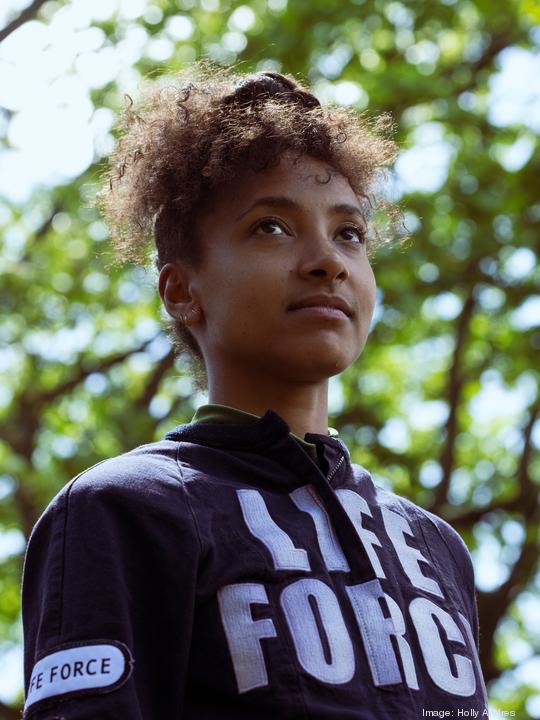
Esperanza Spalding, the native Portlander with several Grammies to her name, has worked with such legends as Tony Visconti (who produced David Bowie) and Wayne Shorter, with whom she crafted an opera that’s coming out this fall.
Her biggest achievement, though, is yet to come: Spalding wants to build a sanctuary where BIPOC artists can hone their craft. Spalding, whose music deftly explores boundaries of jazz, soul and rock, has collected $300,000 to purchase three-quarters of an acre in North Portland. She reached the goal this month with help from an anonymous donor.
The space will feature an indoor shop, a library, a cafe and a wrap-around deck for community meetings, meals and music sharing. The basement will hold studios for both recording and rehearsals. The exterior will offer a half-acre organic vegetable and herb garden.
Getting this far has been difficult, and an eye-opening experience for Spalding. Even with no debt, a paycheck from Harvard and a high-profile musical career, Spalding said she could not secure traditional financing to help purchase the space she needed for the sanctuary. We talked with her about that frustrating experience and about her excitement for what’s ahead.
What have you learned during the fundraising? I’m finding that there are a lot of blockages to home ownership, if you’re a person who doesn’t have traditional forms of credit. It’s been humbling. I don’t know what my role in the advocacy of this will be, but, I have a half-time job at Harvard, I have a paycheck, I have a W2. I’m clearly known and credible. I have the money in my savings account, I have half of the cash in my savings account. And with all that, because I was never in debt, I paid everything when it was due, I didn’t have a credit card, I paid off my student debt. Who is out here getting these mortgages? I felt like I was a prime candidate.
It would seem that way. I never really had a dream of being a homeowner, to be honest. But I realized that it was a way I could do this vision, this sanctuary space, and then seeing what was actually going on and how I would be treated like this. It’s not overtly demeaning, but it’s demeaning.
This is just mind-blowing. If this is happening to me, what does a person with a full-time job who doesn’t have an accountant and maybe takes care of a parent or something … How are they supposed to navigate all this?
The sanctuary has been part of your vision for a long time, like, around 2005 or so. Probably longer, since I could start saving for something like this. Over the last few years, I’ve been invited to do these residencies where it’s unstructured enough that you’re not being asked to perform or produce. But it’s structured enough that you have the basic needs taken care of. So you can just focus on your work and focus on connecting with other artists there. It does something for the craft. It was the first time that I ever was afforded the opportunity to only be engaged with my work. And, I think that’s some of the best work I’ve made.
It looks like you’re focusing heavily on Portland artists for these spaces. Yes, if one of the artists studios happens to be free, and, if they’re, I don’t know, a dancer from Bulgaria or Zimbabwe, they could probably stay there.
But it’s important to note that I’m not trying to serve all the needs of art. The whole artists community is important, but that’s not the point. This is designed and informed by the people I know. It’s a safe bet (they’ll) find it restorative, and also, a model that I think is really easy to recreate and modify according to the needs of your community, and other people that you’re in affinity with.
Talk about how the pandemic affected you as a musician. Were you getting ready to tour or anything? Well, actually, I was in a really odd circumstance, because I was about to do an opera project (with Wayne Shorter) that didn’t require me to tour. I also had the teaching gig at Harvard. So that allowed me to (avoid) the chaos that my friends and colleagues and family were (experiencing).
But it was so profound and empowering to see the way that musicians who had just lost other gigs found the energies and the bandwidth to create all of this peer support, and backup, and resource sharing. I saw that a whole new dimension of the music economy was born, because the gigs dried up. So I’m excited now moving forward, when I plug back in the music economy, to plug in more horizontally to some of this infrastructure that has developed in the absence of the venue, in the absence of the promoters.
— Andy Giegerich
CLOSER LOOK
Esperanza Spalding
Title: Musician, three-time Grammy winner, part-time Harvard professor
Born: Portland
Education: Portland State University and Berklee School of Music
Records of note: "Esperanza," her debut which spent 70 weeks on the Billboard Contemporary Jazz chart; "Chamber Music Society," a critic favorite released in 2010; "Emily's D+Evolution," a jazz-rock hybrid that masterfully displays her world-class bass chops and songbird voice.



